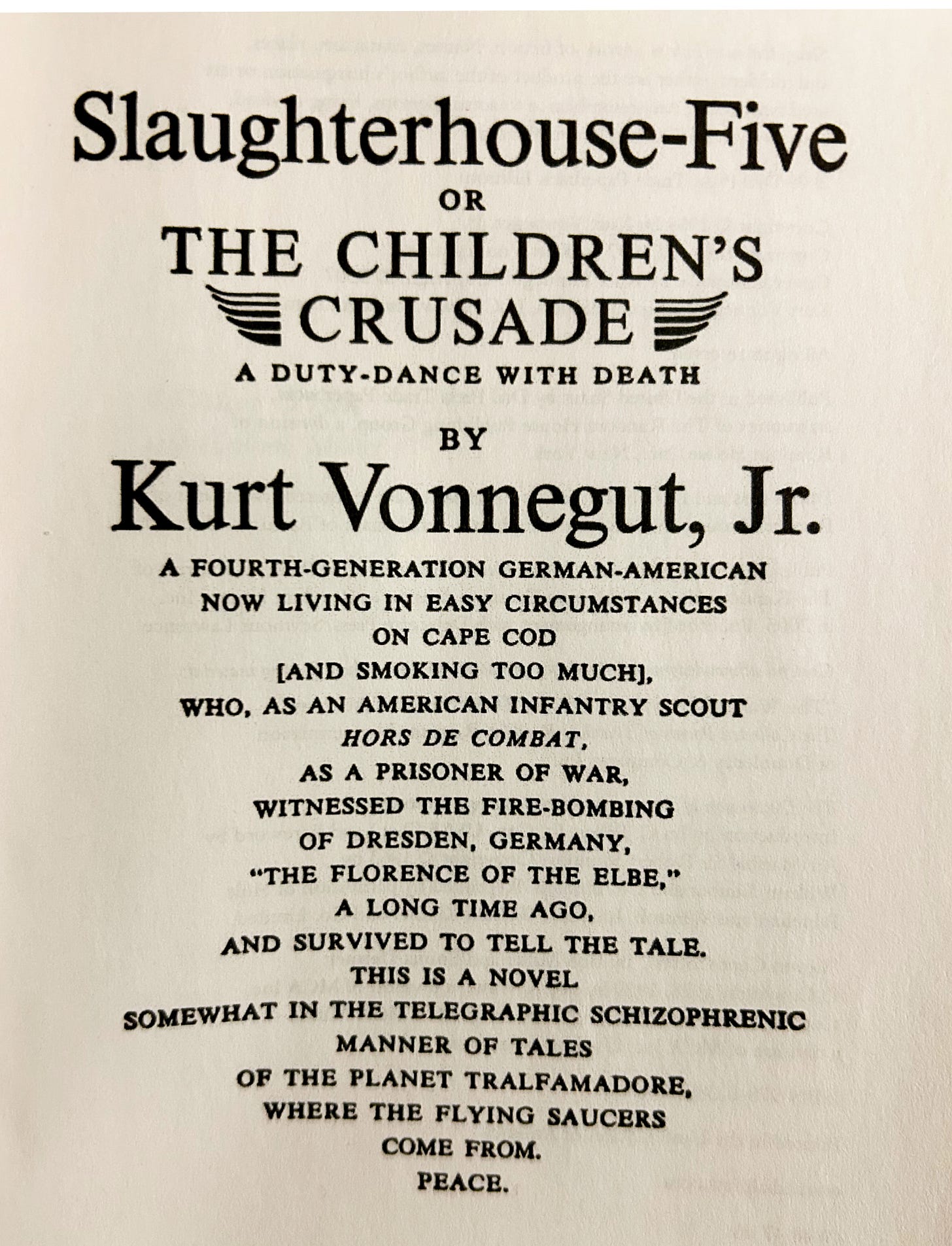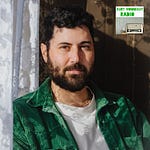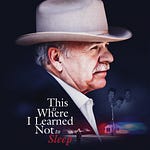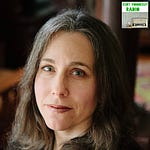This podcast and newsletter will always be free, but it’s also how I buy groceries. So if you dig the show, please consider becoming a paid subscriber.
I’m here to talk about why I named my podcast Kurt Vonnegut Radio. And why Kurt Vonnegut is the best writer to read on July 4th. I also want to talk about the America that Kurt Vonnegut loves. Which sounds kind of crazy, doesn’t it, loving America? I mean, honestly, can a sane person even love America in 2023?
George Orwell said that in deceitful times, telling the truth becomes a revolutionary act. And Kurt Vonnegut is nothing if not a one man revolution whose one-liners were like wrecking balls, knocking down so many of the lies that prop up the darker side of our society. On the page, Vonnegut is nonchalant, a wiseacre, but he is tough and he is courageous. And I don’t say that a lot about writers. He performed perilous reconnaissance missions into the abyss of the human condition and returned with witty and horrific news.
The joke writer as novelist
Vonnegut is the only novelist I know of who saw himself first and foremost as a joke writer. Any discussion on the craft of writing, for Vonnegut, was about the mechanics of joke telling, and how his books are patchwork quilts of jokes that all hang together in a narrative. I’m not even convinced that Vonnegut was being completely honest about his books being comprised of jokes, but I think it’s the story he needed to tell himself in order to be able to write. To not freeze up, to not feel too self-conscious of the fact that writing well involves the literal making of miracles, which is kind of a terrifying prospect to wake up to everyday. Vonnegut’s writing often feels like he is speaking directly to you from the grave (even when he was alive, his books felt like they were speaking to you from the other side).
Why Vonnegut is perfect for July 4th
On July 4th, I tweeted out this Vonnegut quote about librarians from his last book, A Man Without A Country:
And Vonnegut’s quote about librarians resonated with a lot of people including Marianne Williamson:
How Vonnegut ties into my origin story as a writer
I want to give a shout out to my 7th grade teacher Ms. Diacont at Daniels Middle School in Raleigh NC, who learned that I wanted to be a writer on the first day of class when each one of us students had to stand up and introduce ourselves and say what we wanted to be when we grew up. At the end of the class, Ms. Diacont beelined over to my desk and said, "I love that you want to be a writer! I always wanted to be a writer. Have you read Kurt Vonnegut? He's my favorite. The way he thinks and sees the world is so unique. Here read this,” she said, placing her own copy of Breakfast of Champions on my desk. “I can’t wait to hear what you think.”
A spiritual communion between book lovers
Even all these years later, I still remember what that experience felt like there in the classroom. Ms. Diacont was overflowing with excitement, she was beaming, there was no filter or guile, and I have never exactly seen or felt another human light up in front of me in just that way. She was radiant at the mere prospect of me wanting to be a writer, and she was hyped to share this book with that had such a profound impact on her, Breakfast of Champions. What we were experiencing that day was a spiritual communion of sorts, over our love of books. She started asking me who my favorite authors were, and at that time I was a reading a ton of John Irving, so I told her about that. But what really made this moment special is she was telling me her deep truth, that she’d always wanted to be a writer. She was focusing on me as if I were the only person in the room, and all the other kids who were getting up from their desks and exiting the classroom, it was like they didn’t exist. And I could feel that with her whole heart she thought it would be fabulous if I could be a writer. And that she was rooting for me. God bless you, Ms. Diacont.
Breakfast of Champions is an extraordinary truth-telling device
Personally I think Breakfast of Champions has one of greatest openings of any novel because Vonnegut instantly begins dropping truth bombs on the reader at a staggering clip, like when he explains the role that race played in the founding of America:
Actually, the sea pirates who had the most to do with the creation of the new government owned human slaves. They used human beings for machinery, and, even after slavery was eliminated, because it was so embarrassing, they and their descendants continued to think of ordinary human beings as machines.
The sea pirates were white. The people who were already on the continent when the pirates arrived were copper-colored. When slavery was introduced onto the continent, the slaves were black.
Color was everything.
Then Vonnegut goes on to distill the truth about America's origin story in these next 2 potent paragraphs (The novelist Michael Chabon once said on Twitter he cries every time he reads that last sentence in the 2nd paragraph below, and I know just what he means.) Here’s that next passage from Breakfast of Champions:
Here is how the pirates were able to take whatever they wanted from anybody else: they had the best boats in the world, and they were meaner than anybody else, and they had gunpowder, which is a mixture of potassium nitrate, charcoal, and sulphur. They touched the seemingly listless powder with fire, and it turned violently into gas. This gas blew projectiles out of metal tubes at terrific velocities. The projectiles cut through meat and bone very easily; so the pirates could wreck the wiring or the bellows or the plumbing of a stubborn human being, even when he was far, far away.
The chief weapon of the sea pirates, however, was their capacity to astonish. Nobody else could believe, until it was much too late, how heartless and greedy they were.
Kurt Vonnegut had incredible emotional range
Vonnegut’s aesthetic sweet spot is the fine line between between laughter and horror. But at what cost, for a writer to operate out of that space? I mean it’s not like he had a choice. But the psychic toll it took on him seems huge. You definitely get the feeling Vonnegut may have lost a marble or two along the way. His nerve endings seem frayed beyond repair. When you listen to his interviews, he laughs so hard sometimes it honestly sounds like he’s trying to kill himself. You sense this man cries easily when alone. He grieves for our planet and the cruel stupidity of humankind. Vonnegut’s heart is smashed all to pieces but his mind is a joke making machine. He is the very essence of soulful gallows humor. And in this way, an incredibly graceful human being.
Vonnegut experienced the worst horrors
What I love about Vonnegut is he survived what is arguably the most horrific war experience of any American GI ever. If you’re not familiar with his life story, I highly recommend you check out the documentary that came out in 2021: Unstuck in Time, directed by Robert B. Weide.
Anyway, during World War II, Vonnegut was an Army infantryman and got captured as a POW by the Germans in Dresden. And when the allies firebombed the city of Dresden, he and his fellow POWs were kept underground in a slaughterhouse. And when Vonnegut and his fellow POWs finally emerged from the slaughterhouse they found the entire city of Dresden had been burned to the ground. And there were corpses everywhere. And Vonnegut and his fellow POWs were forced to collect the corpses and dispose of them. But there were too many corpses, and the entire city began to stink of death. And so he and his fellow POWs were forced to make giant bonfires, and dump the corpses on the fires. And somehow Vonnegut, miraculously, emerged from that hell, spitting jokes and truth about income inequality and race and climate crisis and fossil fuels and American history. He also wrote his war novel, Slaughter House-Five, in which his veteran protagonist Billy Pilgrim becomes “unstuck in time.” The concept of being “unstuck in time” was an ingenuous way for Vonnegut to talk about the experience of suffering from PTSD, which technically didn’t exist when he wrote the book. And here is the title page to that book:
And here, in typical fashion, is Vonnegut on one of greatest subjects, the American dream, from God Bless You, Mr. Rosewater:
Honest, industrious, peaceful citizens were classed as bloodsuckers, if they asked to be paid a living wage. And they saw that praise was reserved henceforth for those who devised means of getting paid enormously for committing crimes against which no laws had been passed. Thus the American dream turned belly up, turned green, bobbed to the scummy surface of cupidity unlimited, filled with gas, went bang in the noonday sun.
Vonnegut's definition of capitalism, that you get filthy rich by committing crimes against which no laws have been passed, is perfect.
But Vonnegut’s ultimate goal is always to connect you to your humanity. He is most terrifying when he is tender, which is often. Vonnegut wrote like Muhammed Ali boxed: there is a profound sense of joy and play in his work, but there is also violent ferocity unleashed from some place within that will forever remain unknowable to us. What else did Vonnegut and Muhammad Ali have in common? They were revolutionaries whose personal demons threatened to devour them. Thus their exquisite sense of humor, their impeccable timing. If you know what I’m talking about, then you know these are vital tools for survival. Vonnegut’s books always feel like they were written by someone standing before a firing squad who was asked if he had any last words.
How Vonnegut became my north star
True story, if you’ll recall from my recent post about Cormac McCarthy, I joined the Marine Corps in part because of a passage from Blood Meridian. I genuinely thought I was going to be the next writer in that Faulkner/McCarthy tradition. But the joke was on me, because much to my horror I discovered that I was a funny writer. And it was Vonnegut who ultimately helped me realize that my time in the Marine Corps didn’t turn me into a “killing machine” but rather it grew my humanity and capacity to love people from all different walks of life. It was Vonnegut, not McCarthy, who ultimately became my north star.
And so many of my life choices have been based on things that Vonnegut did (for instance, I live on Cape Cod and am writing this just a few miles from where he wrote many of his best books, including Slaughter-House Five.) In so many ways, my life has just been a slow waltz with Kurt Vonnegut’s ghost (even when he was alive). But I also know that Vonnegut was just as obsessive about his own writing hero, Mark Twain. Now I’m not saying I belong in a conversation about Mark Twain and Kurt Vonnegut, I’m just saying that every day when I wake up in the morning, I know what the assignment is and what I am here to do. Thanks in large part to Ms. Diacont.
PS. Which brings me to the name of my podcast: This post is designed to explain in part why I am changing the name of my podcast (if only temporarily) to Kurt Vonnegut Radio (this name change might just be a place holder.) But one thing is for sure, the name can no longer be Twitter Verse, given the loathsome owner of that site. I will have more announcements about the podcast very soon (podcast is about to be back in full force). Peace.
Hi, I’m Gabe Hudson, and this is Kurt Vonnegut Radio, my Substack. It will always be free, but it’s also how I pay for groceries. So please consider upgrading to a paid subscription: just $5/month or $50/year. You can also receive my eternal love by becoming a Lifetime Member at $150.
show notes
Rate/review our show on podcast app of your choice (this is a HUGE help, ty)
Listen to these other KVR episodes:
Follow Kurt Vonnegut Radio on podcast app of your choice
Contact me at gabehudsonpod(at)gmail.com




















Share this post